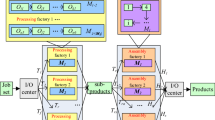Abstract
Scarce resources such as material, labor, and equipment are to be optimized to improve the performance and lower production costs in flexible assembly lines. These resources are usually allocated optimally through the generation of schedules. In this paper, variants of a differential evolution-based algorithm are employed to schedule flexible assembly lines (FAL). The performance of the assembly line is optimized based on two performance criteria, namely the weighted sum of Earliness/Tardiness penalties and the balance of the assembly line. Different variants of the Bi-level differential evolution (BiDE) algorithms are developed to study the effects of three FAL problems. The parameters of BiDE algorithm for FAL problems are fine-tuned. The performance of the BiDE algorithm is evaluated using the datasets and the Bi-level Genetic Algorithm (BiGA) available in the literature. The experimental results show that the proposed differential evolution-based algorithm outperforms BiGA in terms of mean best fitness.




Similar content being viewed by others
References
Blazewicz, J.,& Kovalyov, M. (2002). The complexity of two group scheduling problems. Journal of Scheduling, 5, 477–485.
Celano, G., Costa, A., Fischera, S.,& Perrone, G. (2000). Fuzzy scheduling of a flexible assembly line through an evolutionary algorithm. IEEE International Conference on Systems, Manufacturing, and Cybernetics, 1, 328–333.
Chan, F., Chan, H.,& Lau, H. (2002). The state of the art in simulation study on FMS scheduling: A comprehensive survey. The International Journal, Advanced Manufacturing Technology, 19, 830–849.
Das, S., Abraham, A., Chakraborty, U. K.,& Konar, A. (2009). Differential evolution using a neighourhood-based mutation operator. IEEE Transactions on Evolutionary Computation, 13, 526–553.
Das, S., Chakraborty, U.K.,& Konar, A. (2005). Two improved differential evoluion schemes for faster global search. In Genetic and Evolutionary Computation Conference, pp. 991–998.
Das, S.,& Suganthan, P. (2011). Differential evolution: A survey of the state-of-the-art. IEEE Transactions of Evolutionary Computation, 15, 4–31.
Donath, M.,& Graves, R. (1988). Flexible assembly systems: An approach for near real-time scheduling and routeing of multiple products. International Journal of Production Research, 26, 1903–1919.
Donath, M., Graves, R.,& Carlson, D. (1989). Flexible assembly systems: The scheduling problem for multiple products. Journal of Manufacturing Systems, 8, 27–34.
Etiler, O., Toklu, B., Atak, M.,& Wilson, J. (2004). A genetic algorithm for flow shop scheduling problems. Journal of the Operational Research Society, 55(8), 830–835.
Guo, Z., Wong, W., Leung, S.,& Fan, J. (2009). Intelligent production control decision support system for flexible assembly lines. Expert Systems with Applications, 36, 4268–4277.
Guo, Z., Wong, W., Leung, S.,& Fan, J. (2008a). A genetic algorithm-based optimization model for scheduling flexible assembly lines. The International Journal, Advanced Manufacturing Technology, 36, 156–168.
Guo, Z., Wong, W., Leung, S., Fan, J.,& Chan, S. (2008b). A genetic algorithm-based optimization model for solving the flexible assembly line balancing problem with work sharing and workstation revisiting. IEEE Transactions on Systems, Manufacturing and Cybernetics, 38, 218–228.
Jie, G., Mitsuo, G.,& Linyan, S. (2006). A hybrid of genetic algorithm and bottleneck shifting for flexible job shop scheduling problemA hybrid of genetic algorithm and bottleneck shifting for flexible job shop scheduling problem. GECCO, 2006, 1157–1164.
Laarhoven, P., Aarts, E.,& Lenstra, J. K. (1990). Job shop scheduling by simulated annealing. Journal of Operations Research, 40, 113–125.
Liao, C.-J., Tseng, C.-T.,& Luarn, P. (2005). A discrete version of particle swarm optimization for flowshop scheduling problems. Computers& Operations Research, 34(10), 3099–3111.
Liaw, C.-C. (1999). A branch-and-bound algorithm for the single machine earliness and tardiness scheduling problem. Computers& Operations Research, 26, 679–693.
Nearchou, A.,& Omirou, S. (2006). Differential evolution for sequencing and scheduling optimization. Journal of Heuristics, 12, 395–411.
Pan, Q.-K., Tasgetiren, M. F., Suganthan, P.,& Chua, T. (2011). A discrete artificial bee colony algorithm for the lot-streaming flow shop scheduling problem. Information Sciences, 181, 2455–2468.
Rajendran, C.,& Ziegler, H. (2004). Ant-colony algorithms for permutation flowshop scheduling to minimize makespan/total flowtime of jobs. European Journal of Operational Research, 155, 426–438.
Rao, R. V., Savsani, V. J.,& Vakharia, D. P. (2011). Teaching-learning-based optimization: A novel method for constrained mechanical design optimization problems. Computer-Aided Design, 43, 303–315.
Rashedi, E., Nezamabadi-pour, H.,& Saryazdi, S. (2009). GSA: A gravitational search algorithm. Journal of Information Sciences, 179, 2232–2248.
Salehi, M. (2011). Optimization process planning using hybrid genetic algorithm and intelligent search for job shop machining. Journal of Intelligent Manufacturing, 22, 643–652.
Sawik, T. (2000). An LP-based approach for loading and routing in a flexible assembly line. International Journal of Production Economics, 64, 49–58.
Shah-Hosseini, H. (2011). Principal components analysis by the galaxy-based search algorithm: A novel metaheuristic for continuous optimisation. International Journal of Computational Science and Engineering, 6, 132–140.
Storn, R.,& Price, K. (1997). Differential evolution—a simple and efficient heuristic for global optimization over continuous spaces. Journal of Global Optimization, 11, 341–359.
Vincent, L. W. H.,& Ponnambalam, S. G. (2011). Scheduling flexible assembly lines using differential evolution. Swarm, Evolutionary, and Memetic Computing, Lecture Notes in Computer Science, 7076(2011), 43–50.
Vincent, L. W. H.,& Ponnambalam S.G. (2012). Scheduling flexible assembly lines using variants of differential evolution. In Proceedings of IEEE International Conference on Automation Science and Engineering (CASE), pp. 590–595.
Author information
Authors and Affiliations
Corresponding author
Rights and permissions
About this article
Cite this article
Vincent, L.W.H., Ponnambalam, S.G. & Kanagaraj, G. Differential evolution variants to schedule flexible assembly lines. J Intell Manuf 25, 739–753 (2014). https://doi.org/10.1007/s10845-012-0716-8
Received:
Accepted:
Published:
Issue Date:
DOI: https://doi.org/10.1007/s10845-012-0716-8




